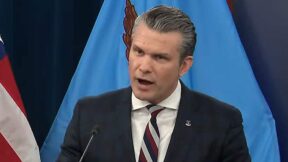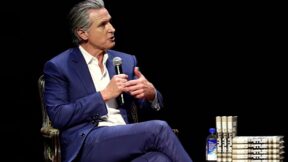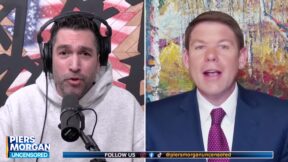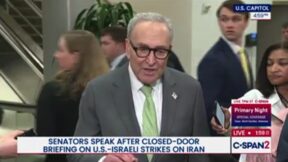‘No Scott!’ CNN’s Abby Phillip Shoots Down Jennings Over Trump’s Assault on Fed Chair
CNN anchor Abby Phillip shot down Scott Jennings for repeating an argument about the influence of President Donald Trump’s attacks on Federal Reserve Chairman Jerome Powell.
On Tuesday night’s edition of CNN NewsNight, Phillip and Jennings were joined by Xochitl Hinojosa, Shermichael Singleton, and Chuck Rocha for a discussion on Trump’s relentless attacks on Powell and attempts to influence monetary policy.
But when Jennings repeatedly defended Trump’s right to “render an opinion about monetary policy,” a fed-up Phillip finally called him out:
PHILLIP: I’m going to step in here because I don’t want us to change the subject, okay? We are talking about the independence of the Fed. Do you agree or disagree that the Fed should be independent?
JENNINGS: I think the president should be able to render an opinion about monetary policy.
PHILLIP: That is a yes or no —
JENNINGS: Now, whether he should be able to fire him isn’t a question.
PHILLIP: That is a yes or no question. Should the Fed be independent of the whims of any president of the United States?
JENNINGS: I think the president ought be able to have opinions.
PHILLIP: Why can’t you say yes or no? Shermichael, hold on a second.
JENNINGS: I think it’s an open question where they should be able to fire the head of the Fed. Some Republican senators don’t agree.
PHILLIP: So, Scott, all right —
JENNINGS: But I don’t. I just think the idea that the president should not have any opinion about monetary policy is crazy.
PHILLIP: I am going to give you a third try on this one. Should the Fed’s decisions about how they operate, the interest rates, when they raise or lower them, should they be independent of the president of the United States?
JENNINGS: Does independent mean they don’t take his opinion into consideration?
PHILLIP: Independent means, no, they don’t take his opinion into consideration.
JENNINGS: I don’t agree with that. I’m sorry. I think the president —
PHILLIP: Hold on.
JENNINGS: I think the president should be able to render an opinion.
PHILLIP: I’m going to ask Charlotte. What do — you know, this was taken in by the markets, that idea right, this week. What was the reaction among people who are making money, they have businesses, they are operating in the financial word world to this idea that people like Scott believed that the Fed should be listening to the president and act accordingly?
JENNINGS: That’s not what I said. You put words in my mouth. I said, should he be able to render an opinion and should the Fed take that any consideration.
PHILLIP: No.
JENNINGS: I think he should be able to have an opinion.
PHILLIP: I didn’t say anything —
JENNINGS: And they should take that. He shouldn’t be the only thing but he should have an opinion.
PHILLIP: The president can have whatever opinions he wants. What I’m asking is whether the Fed should be independent in their decision- making from those opinions.
JENNINGS: I said, does that mean they can take his opinion into consideration, and I think they should take the president’s opinion. And that’s not the only thing. That’s one of the things.
PHILLIP: All right. Well, let me ask if Charlotte has some thoughts on this.
HOWARD: I think it’s very clear from the market’s response that the most — not just the desired outcome, you know, the fundamental law of nature needs to be that the Federal Reserve, the chair of the Federal Reserve, makes decisions on monetary policy that are based on economic data, not on the whims of a president. And that’s very, very clear.
And I think, you know, the job of the Fed is complex, particularly in the environment in which Trump has placed Jerome Powell, where you have a threat of slowing growth and increasing inflation due to these tariffs, right? So, you have the stagflationary environment. That’s very hard for the Fed to manage.
It is true that some investors probably, if Jerome Powell were to lower interest rates, you know, I’m not going to predict how the Fed, the market would respond, however, it’s very, very clear that the market responds extremely negatively to even a hint that the president might intervene.
JENNINGS: Intervening and rendering an opinion are two different things.
ROCHA: There’s a direct effect here with the American worker that has to do with China and with the stock market that people are seeing every day. Donald Trump ran on being tough on China and workers and folks in America, they love that talk, they love being tough on China. But they also love getting really cheap stuff from Walmart and they can’t have both at the same time. And I think that’s why you see him backing off of that.
With the stock market, regular folks don’t understand Dows and bonds and all that. But they understand their 401(k) and I think that’s where the pressure’s coming from, is people around here saying, you’re hurting your own people. And so you see people backing down.
(CROSSTALKS)
JENNINGS: Do you honestly believe the president shouldn’t be able to render opinions about monetary policies?
PHILLIP: Scott, you keep repeating something that nobody ever said. No one ever said that Trump cannot have it.
JENNINGS: We’re having original thoughts here.
PHILLIP: No, Scott. No one ever said that Trump can’t have an opinion. The question is, should the Fed act based on that opinion? And I think it’s just common sense, right? The Fed, it should be acting based on economic information and data, not anybody’s opinion. Trump is not an economist, and as far as I can tell, does not even have a good grasp on how trade works, which is really problematic if he’s going to then turn around and start telling the Fed how to do stuff.
JENNINGS: (INAUDIBLE) we don’t want Donald Trump to have influence over the operation of the government. And, you know, I just think it’s wrong.
PHILLIP: We don’t want to have Donald Trump have influence over monetary policy. That is how it has worked. That is where the confidence in this system of economics comes.
JENNINGS: You said monetary policy. She said DOJ, military, FBI. What were the other —
(CROSSTALKS)
PHILLIP: Hold on just a second. I’m going to reset because I’m going to change back to the original conversation because, Scott, you are attempting to change the subject multiple times.
Watch above via CNN NewsNight.
New: The Mediaite One-Sheet "Newsletter of Newsletters"
Your daily summary and analysis of what the many, many media newsletters are saying and reporting. Subscribe now!






Comments
↓ Scroll down for comments ↓